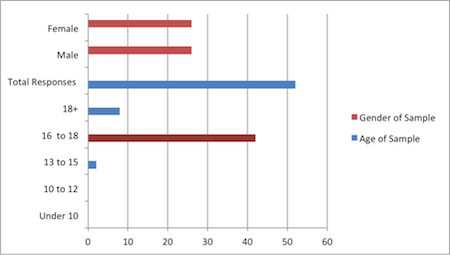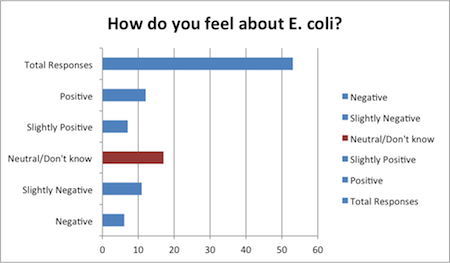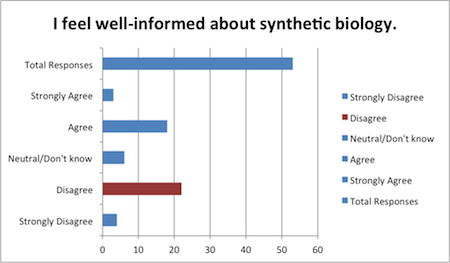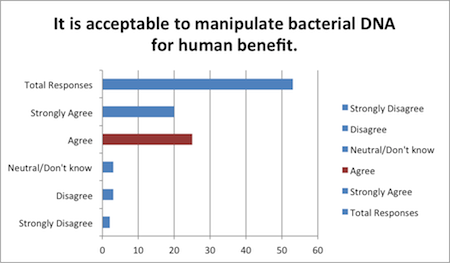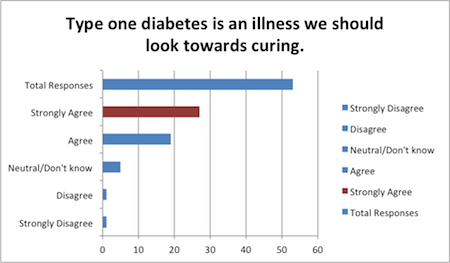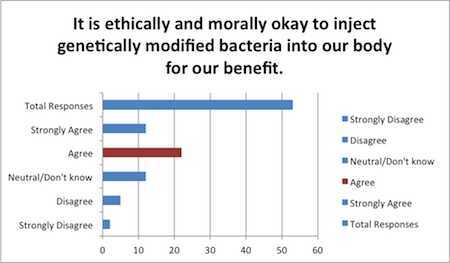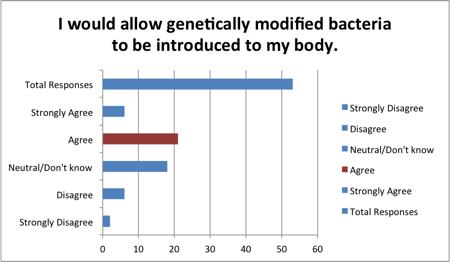Team:Lethbridge Canada/Human Practices
From 2012hs.igem.org

| Home | The Team | The Project | Results | Human Practices | Notebook | Safety |
|---|
Human PracticesIntroductionFor our human practices component, we designed a survey, conducted interviews, and created posters. The surveys were administered to the public through the Internet; the posters were put up at our schools and handed out to community members; the interviews were given to biology and chemistry teachers at our schools. We decided to discuss the benefits and challenges of synthetic biology with science educators within our schools since they will be educating future generations of students (and iGEMers!!) on synthetic biology. SurveyWe distributed a survey to the public through the Internet; this survey consisted of nine questions (shown below). We received 52 responses in total.
1. What is your age? 2. What is your gender? The possible answers to the first question ranged from "under 10" to "over 18", with intervals of two years in between those ages; we did this because, as we were distributing this survey primarily through social media websites, we wanted a more comprehensive view of our audience. Our survey takers were mostly sixteen to eighteen years old inclusive (80.8%), and they equally represented both genders.
3. How do you feel about E. coli? The possible responses to this question were ranked on a scale from "negative" to "positive". The most popular response among our survey-takers was "neutral/don't know" (32.1%).
4. How well-informed about synthetic biology do you feel? The possible responses to this question were ranked on a scale of "strongly disagree" to "strongly agree". The most popular response among our survey-takers was "disagree" (41.5%).
5. Do you feel it is acceptable to manipulate bacterial DNA for human benefit? The possible responses to this question were the same as those for the question above. The most popular response among our survey takers was "agree"(47.2%).
6. Is type-one diabetes an illness we should look toward curing? The possible responses to this question were the same as those for question four. The majority of our survey-takers answered "strongly agree" (50.9%).
7. Is it ethically and morally okay to inject genetically modified bacteria into our body for our benefit? The possible responses to this question were, once again, the same as those for question four. The most popular response among our survey-takers was "agree" (41.5%).
8. Would you allow genetically modified bacteria to be introduced to your body? Predictably, the possible responses to this question were the same as those for question four. The most popular response among our survey-takers was "agree" (39.6%).
9. How did you hear about this survey? This question was "short-answer"; we therefore, unfortunately, received some results that were not usable (such as "asdf"). However, the vast majority of the responses to this question mentioned the popular social media website known as Facebook© A random sample of the responses can be found to the left. We have learned to be more specific when asking questions like these.
InterviewsWe interviewed our chemistry and biology teachers. These questions were more in-depth than those in the survey; as such, the answers were far more descriptive. 1. When I say "synthetic biology", what comes to mind? "What comes to my mind with synthetic biology is manipulating things in the lab to get things that don't exist naturally in nature." "When you say synthetic biology i tend to think of engineering life forms from scratch or engineering the genome of a creature or bacteria to make something useful." "When I hear the term “synthetic biology” I think of creating or changing living organisms in the laboratory."
"Yes." "Absolutely. I have no problem with it whatsoever. The only problem i have with engineering the bacteria is when people use it for specific uses such as biological warfare." "I believe engineering bacteria is ethical as long as it is in a controlled environment where they can be studied to see what the long term effects of the engineering are."
"It would depend on the type of organism and the type of effect it would have on my body. I guess I would weigh the pros and cons then decide." "I would but it would depend on the circumstances. If I was severely sick and this engineered bacteria would save me then yes. But if it was for testing or just because then I wouldn't allow it." "I would allow genetically engineered bacteria to be introduced to my body if it was for a necessary purpose. I would have to know that the genetically engineered bacteria had been studied long-term and that there would not be unforeseen side effects of their introduction."
"Raw chicken." "E. coli is one of the most common bacteria. There are many strains of it but there is only one strain that is harmful." "When I hear the term E. coli I first think of food poisoning, but I also know that E. coli is a natural part of the flora of the human digestive system."
[At this point, we enlightened the interviewees to our project.]
"No, because I think that it is mostly used for health purposes and the more we can improve the health of people in our population the better." "No. I think that the fact that synthetic biology is a new-ish thing and that we can help people with incurable diseases like diabetes is awesome." "My opinion of synthetic biology or E. coli has not changed. Reading the project information has made me more aware of the many uses and applications for genetically modified bacteria."
"I'd see it helping in the medical field." "I think synthetic biology has a huge part in medical advancement. We could use it to manufacture patient-specific drugs, correct enzymatic diseases or correct genetic defects. It could also be used for non-medical purposes such as producing biofuels." "I see synthetic biology as the potential to use bacteria to produce substances that the body needs but fails to make on its own. The possibility of finding ways to increase medicines produced through transgenics also has great potential. I think that the challenge of synthetic biology will be to inform the general public about what it is and to make sure they understand the potential and also how risks are controlled." PostersOn our posters, we included information about iGEM, a brief description of synthetic biology, and a very general explanation of our project. We then distributed these at various locations within the city; additionally, we posted some at our schools. A download link for the poster can be found here.






|
 "
"

